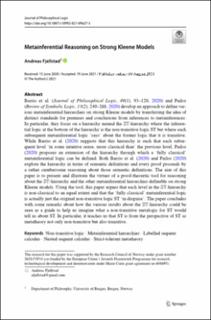Metainferential Reasoning on Strong Kleene Models
Journal article, Peer reviewed
Published version

Åpne
Permanent lenke
https://hdl.handle.net/11250/2770548Utgivelsesdato
2021Metadata
Vis full innførselSamlinger
- Department of Philosophy [240]
- Registrations from Cristin [9791]
Sammendrag
Barrio et al. (Journal of Philosophical Logic, 49(1), 93–120, 2020) and Pailos (Review of Symbolic Logic, 2020(2), 249–268, 2020) develop an approach to define various metainferential hierarchies on strong Kleene models by transferring the idea of distinct standards for premises and conclusions from inferences to metainferences. In particular, they focus on a hierarchy named the ST-hierarchy where the inferential logic at the bottom of the hierarchy is the non-transitive logic ST but where each subsequent metainferential logic ‘says’ about the former logic that it is transitive. While Barrio et al. (2020) suggests that this hierarchy is such that each subsequent level ‘in some intuitive sense, more classical than’ the previous level, Pailos (2020) proposes an extension of the hierarchy through which a ‘fully classical’ metainferential logic can be defined. Both Barrio et al. (2020) and Pailos (2020) explore the hierarchy in terms of semantic definitions and every proof proceeds by a rather cumbersome reasoning about those semantic definitions. The aim of this paper is to present and illustrate the virtues of a proof-theoretic tool for reasoning about the ST-hierarchy and the other metainferential hierarchies definable on strong Kleene models. Using the tool, this paper argues that each level in the ST-hierarchy is non-classical to an equal extent and that the ‘fully classical’ metainferential logic is actually just the original non-transitive logic ST ‘in disguise’. The paper concludes with some remarks about how the various results about the ST-hierarchy could be seen as a guide to help us imagine what a non-transitive metalogic for ST would tell us about ST. In particular, it teaches us that ST is from the perspective of ST as metatheory not only non-transitive but also transitive.
